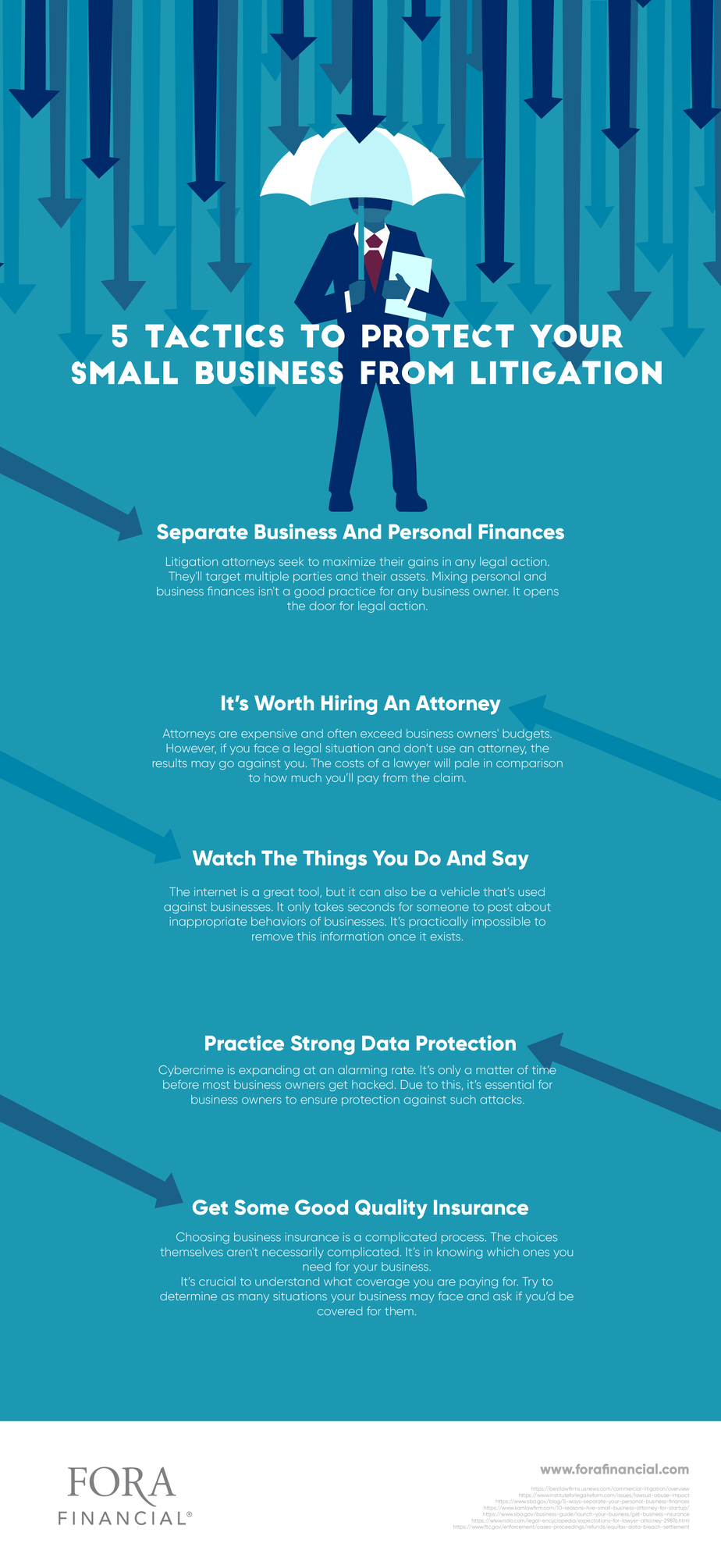January 30, 2020
5 Tactics To Protect Your Small Business From Litigation
There are steps small businesses can take to reduce the risks. They can help you run your business with confidence. Sometimes, even if you're sued, the impact may be smaller by using these steps.
In this post, we'll review five ways you can protect your small business from litigation.


People Love To Sue
Often, people are trigger-happy when it comes to suing others. Stories of lawsuits are commonplace. Many people, who wouldn’t think to sue, change their minds with coaching from lawyers. For litigation attorneys, this is their business. Media stories also highlight potential payouts, which is another draw for lawsuits. When someone learns they can sue a McDonald’s restaurant for its coffee being too hot, the wheels begin turning in people’s minds. Which business will be next? Hopefully, it isn’t yours.How to Protect Yourself From Litigation
What is litigation? Litigation is the process of taking legal action and covers more than lawsuits. It can include settling out of the court system and the appeals process. Litigation can also include arbitration or mediation. No matter how you define it, you’ll want to protect your business. Commercial litigation involves a claim within a business context. However, when legal teams learn that business owners have not protected their personal assets, they’ll target those assets. The following describes the five tactics that you can use to protect your business.1. Separate Business And Personal Finances
Litigation attorneys seek to maximize their gains in any legal action. They'll target multiple parties and their assets. Mixing personal and business finances isn't a good practice for any business owner. It opens the door for legal action. The IRS is particular about this issue, too. While it can forgive the occasional emergency business purchase from the business owner’s personal funds, a steady habit of these purchases can raise red flags. Tax authorities will probably not be as forgiving with personal items purchased from business funds. This crosses the line into the fraudulent territory. Consider incorporating your business, which can help protect your personal assets to some degree. The process is simple and can be done online. Incorporating may protect your personal assets, but it doesn't protect your business from litigation. Incorporation doesn't prevent a business owner from using personal funds for business purposes. Doing so has the potential to remove the personal protection aspects of being a corporation.2. It’s Worth Hiring An Attorney
Attorneys are expensive and often exceed business owners' budgets. However, if you face a legal situation and don’t use an attorney, the results may go against you. The costs of a lawyer will pale in comparison to how much you’ll pay from the claim. Experienced lawyers understand litigation and can provide sound legal advice. For unfamiliar situations, they're trained to find the answers. Most small business owners aren't capable of handling legal matters independently and will go up against the attorneys of the plaintiffs. In many cases, it’s beneficial to work with an attorney early on. A qualified attorney can help you through all the legal aspects that many business owners fail to consider. The attorney can review insurance policies and employee manuals. They’ll also help you with potential intellectual property issues. Choosing the right lawyer can be challenging, and it’s worthwhile to do some research and ask around. People believe mistakenly that all lawyers can handle every situation. The law is too vast for that to be practical. It’s helpful to know what to expect when hiring a law firm.
3. Watch The Things You Do And Say
The internet is a great tool, but it can also be a vehicle that's used against businesses. It only takes seconds for someone to post about inappropriate behaviors of businesses. It’s practically impossible to remove this information once it exists. You’ll need to monitor the activities of your employees, at least concerning your business. If your employees are posting negative information about your business, this could result in a legal situation. The internet is an audit trail for lawyers to feast on. Even if no legal action is taken against you, recovering from negative press is costly and time-consuming. You’ll be on the defensive, which makes it difficult to continue your normal operations. Proper communication with your employees is essential to prevent these instances. The businesses you deal with also make a difference with your image. If you work with shady vendors, information about them will appear on blogs and review sites. For this reason, screen your vendors carefully. Otherwise, customers may decide to stop buying from your company.4. Practice Strong Data Protection
Cybercrime is expanding at an alarming rate. It’s only a matter of time before most business owners get hacked. Due to this, it’s essential for business owners to ensure protection against such attacks. Data protection is a huge issue. The European Union passed aggressive laws in 2018, known as the General Data Protection Regulation (GDPR). Significant penalties are possible for noncompliance, for businesses of any size. Other regulatory agencies may step in when companies experience compromised data. For instance, credit agency Equifax settled with the Federal Trade Commission (FTC) for a data breach incident in 2017. The company must offer free credit services and pay fines to victims of the incident. Establishing proper data protection will help customers trust your business. It could mean the difference in getting business over your competitors. Customers will choose companies that exercise good judgment and procedures. It’s also essential to be transparent when breaches occur. Protecting data includes backing it up, scanning for viruses and malicious agents, and abiding by customer requests for data removal. When creating a backup plan, store extra copies in remote locations. In the event of a disaster, you can recover your data from this remote location.5. Get Some Good Quality Insurance
Choosing business insurance is a complicated process. The choices themselves aren't necessarily complicated. It’s in knowing which ones you need for your business. The wrong coverage will create a false sense of protection, which is illustrated by the online company KissMetrics. The company was sued for privacy concerns. They had business insurance and thought their coverage was adequate, but the fine print suggested otherwise. It’s crucial to understand what coverage you are paying for. Try to determine as many situations your business may face and ask if you’d be covered for them. There are five main types of business insurance and one that combines coverage, according to the SBA. They include general liability, product liability, professional liability, commercial property, and home-based business. The business owner’s policy simplifies choosing from the others by combining it into one policy. The SBA suggests that business owners reassess their business insurance every year as situations change. The agency also recommends shopping around and finding a reputable agent.